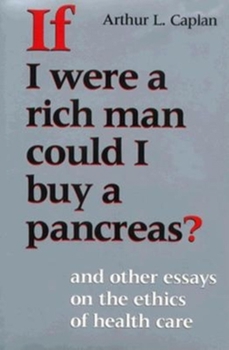If I Were a Rich Man Could I Buy a Pancreas?: And Other Essays on the Ethics of Health Care
(Part of the Medical Ethics Series)
Select Format
Select Condition 
Book Overview
"An important contribution to a debate that will continue for some time." --Health and Canadian Society"Insightful and thought-provoking. . . . As Caplan has demonstrated so clearly . . . we would all... This description may be from another edition of this product.
Format:Hardcover
Language:English
ISBN:0253313074
ISBN13:9780253313072
Release Date:August 1992
Publisher:Indiana University Press
Length:368 Pages
Weight:1.75 lbs.
Dimensions:1.3" x 6.4" x 9.6"
Customer Reviews
1 rating
Money Talks
Published by Thriftbooks.com User , 22 years ago
The answer to the question posed by the title of the centerpiece essay of this collection of 19, and indeed by the book itself, is most emphatically "yes." As the author relates: "A hospital administrator at a large transplant center once permitted me to listen in on one end of a phone call between him and a high-ranking oficial in the State Department. The government official wanted the resident of an important Middle Eastern nation admitted for a kidney transplant because he was a relative of one of the leaders of that nation. The State Department official said it was in our national interest to give this man priority for a transplant. And he was given top priority for an operation that otherwise would not have been available to him." This fundemental unfairness in the distribution of human organs for transplants, Caplan argues, is the reason for the lack of success in luring new donors. Caplan concludes that those who play a role in the process of allocation of organs for transplant must make equity their top priority to convince the public both to support the procurement of organs on a voluntary, altruistic basis and to continue the commitment of public and private funds to pay for transplants. The essays, issued also in paperback, are divided into six groups: (1) the nature of applied ethics; (2) ethical issues in animal and human experimantation; (3) advances in reprodection and genetics; (4) transplants and other unatural acts; (5) aging, chronic illnes, and rehabilitation: and (6) money, medicine, and morality. In addition to the transplant section, in which the title essay falls, two sections are of particular interest. Caplan's balanced view of the controversy surrounding animal experimentation is well worth reading by any scientist engaged in animal or human experimentation. Finally, in the section on the advances in reproduction and genetics, Caplan dicusses the impact of patents on the Human Genome Project and invokes a key concept in understanding the importance of this work. In an interview with the 'Philadelphia Inquirer' published May 1, 1994, Caplan said, "the big breakthrough was to relize that there was such a thing, even for the nazis, as ethics, ...[t]hat's a real threat to my field, because if you can justify mass murder and torture by ethics, then can't you justify anything if you think about it long enough?" There is a time for thought, there is a time for talk, and a time for action.





